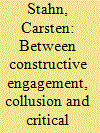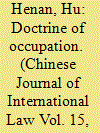|
|
|
Sort Order |
|
|
|
Items / Page
|
|
|
|
|
|
|
| Srl | Item |
| 1 |
ID:
146671


|
|
|
|
|
| Contents |
This article examines the approach and relationship of the ICRC to International Criminal Law. It argues that the International Committee of the Red Cross's (ICRC) position navigates between normative support, collusion and institutional restraint. The ICRC has shaped some of the foundations of contemporary criminal justice, through its early focus on the implementation of International Humanitarian Law (e.g., through implementation and prosecution of “grave breaches”) and its role as “gentle modernizer” of the law. But it has at the same time kept a critical distance towards International Criminal Law. Its approach is marked by three cardinal principles: structural independence, strategic engagement and systemic support. It is grounded in the distinct roles of the ICRC (guardianship, protection, advocacy and dissemination) and deeper structural challenges in the relationship between International Humanitarian Law and International Criminal Law. This contribution argues for a re-conceptualization of some of the existing approaches. It claims that it is unhelpful to theorize on the relationship between the ICRC and International Criminal Courts and Tribunals (ICCTs) on the basis of the premise that International Humanitarian Law provides a set of primary rules that are enforced through criminal institutions, or complemented by secondary rules under International Criminal Law (e.g., war crimes law). It may be more appropriate to view the ICRC and ICCTs as part of a polycentric legal system that is built on a plurality of interactive normative structures and governed by certain checks and balances.
|
|
|
|
|
|
|
|
|
|
|
|
|
|
|
|
| 2 |
ID:
146670


|
|
|
|
|
| Contents |
In contemporary international law, the doctrine of occupation has two aspects: 1) the subject of occupation, i.e. sovereign State; 2) the object of occupation, i.e. terra nullius (land without sovereignty).1 Meanwhile, this doctrine is seen as an analogy from the Roman law of occupatio. Given that international legal theory has transformed through three stages of development from jus gentium in antiquity, to natural law theory in the early modern period to positivism in the nineteenth century, this article aims to examine whether the historical and contemporary meaning(s) of this doctrine have kept validity throughout such paradigm shifts. In particular, contemporary international law pays little attention to the legal status of this doctrine in the natural law tradition. This article finds that the doctrine of occupation has a legal foundation in natural law theory in which this doctrine was seen as applicable to individuals rather than the State and terra nullius was seen as land without private property while sovereignty was only secondarily related to occupation as a result of civil and political developments to establish a public authority within the occupied land. European colonial practices of this doctrine from the sixteenth to the early nineteenth century were consistent with the natural law tradition. Therefore, international legal positivism fails to provide validity to the contemporary meaning of this doctrine under its own theoretical framework.
|
|
|
|
|
|
|
|
|
|
|
|
|
|
|
|
| 3 |
ID:
146669


|
|
|
|
|
| Contents |
Since the Cold War, high—some would say naïve—expectations of a world in which law, impartially interpreted and applied, would have primacy over politics have not materialized. Differing visions of desirable and possible world orders are accompanied by propaganda warfare where even international law is used as a tool of hegemonic dominance or, on the contrary, as an instrument to counter such dominance. Instead of the Cold War rivalry between the liberal capitalistic and communist creeds, today the main competition is between ideologies justifying the continuation and expansion of the uni- or non-polar world with one centre of power, the world that has to become more and more homogeneous (liberal democratic), and a multi-polar balance of power world. This article argues that, taking account of the very size and even more so the cultural and developmental diversities, as well as the complexity and increasing reflexivity, of the world, the only realistically possible international system is a multi-polar one. Moreover, international law, as a normative system based on the balance of interests and compromises and not necessarily on shared ideology (this may underpin domestic legal systems or EU law), can function relatively well only in a multi-polar, balance of power, concert of powers system which is consciously and conscientiously built and accepted as legitimate. And though the processes of globalisation have a tendency to homogenize the world while making many, if not most, societies organized as states more heterogeneous, attempts to accelerate these processes are almost bound to be counter-productive.
|
|
|
|
|
|
|
|
|
|
|
|
|
|
|
|
| 4 |
ID:
146672


|
|
|
|
|
| Contents |
The Shanghai-Hong Kong Stock Connect has been in operation for more than a year. It is predictable that with the implementation of this scheme, cross-border securities disputes between the Mainland and Hong Kong will be on the rise. In resolving these disputes, one of the most important problems is the determination of substantive law that should apply to them. This paper makes feasible proposals to harmonize the choice of law rules regarding cross-border securities disputes under the Shanghai-Hong Kong Stock Connect with due reference made to the approaches adopted by the Hague Convention on the Law Applicable to Certain Rights in Respect of Securities Held with an Intermediary and the Uniform Commercial Code of the US.
|
|
|
|
|
|
|
|
|
|
|
|
|
|
|
|
|
|
|
|
|